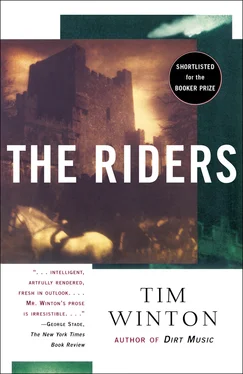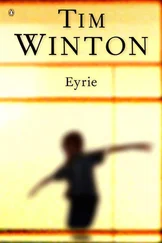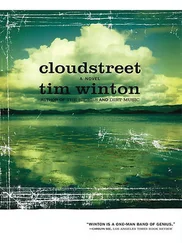Billie held his hand and was jerked into a run to keep up with his long driving strides.
The Lyko, then. Okay, the Lyko. He didn’t mind owning up to it: the expats had always intimidated him. In their presence he felt the complete farmboy, the toolslinger, the deckhand. He looked at them sometimes and felt his knuckles drag on the ground. They were world-sodden, tired, confident, and while you were learning Greek out of a two-buck Berlitz, they were unavoidable. Before Greece, Scully had never met people with hidden money, with independent means, and they fascinated and frightened him. They were Oxford graduates, poor aristocrats, American bohemians, artists and faded lower-order celebrities whose hopes had somehow fallen away. There was a mercenary from Adelaide who he quite liked, and a defrocked priest from Montana who came down from his hilltop eyrie now and then, but the ones who worried him were the ones you saw every day without fail, the ones who staggered down to the waterfront morning after morning and stayed till the wee hours, drinking, sniping, recalling better days. They lived for the youthful influx of summer when they could mingle with the fresh and the novel, when they could whine entertainingly and fall in love, strike poses, relieve each other of the burden of old gossip. They were bright, funny, lordly, talented for the most part, and almost completely idle. To Scully they were like bookish inventions. He learned not to bristle.
Jennifer found them engaging. She loved their backlog of stories, she envied the poets their old words, the sculptors their hands, idle or not, and the heirs their independence. She liked to swim with some of them in the afternoons, or meet them for dinner a few nights a week, and Scully went along, often as not for something to do. To Scully in private Jennifer told cynical jokes about the expats. The two of them rolled their eyes at the mention of oily Rory, the Canadian stud who wrote novels in his few daylight hours, or the two nice queers from Spain who carted a Steinway a thousand steps up to their house with a donkey and two old men. Scully knew why she liked these people. They were not boys and girls who’d followed their parents’ dreary instructions, gone to a sensible school, dated sensible boys, closed off all possibility of spontaneity and ended up as bureaucrats whose job bored them rigid and whose only act of defiance, late in their twenties, was to marry a little beneath themselves. Jennifer admired poor Alvin the gold dealer, who needed a bottle of vodka a day just to sign his own name. Alvin, she said, had class. He just refused to be browbeaten by commonsense, by the mean, the average, the sensible. She liked Lotte the destitute German princess who sublet her rooms in the summer and slept with every guest, male and female, and charged extra for services rendered. And there was Alex, who truly was a worthless bastard, who dined out on his friendship with Francis Bacon, his collaboration with Leonard Cohen, and his fling with Charmian Clift. Alex was a carbuncle, but Jennifer saw his painting talent as awesome, despite his not having squeezed more than a toothpaste tube since the early seventies.
Scully floundered among them all, at parties on terraces high above the harbour, or picnics they took in big rolling caiques to Dokos or Palamidas down the other end of the island, but he learned to survive and he saw what pleasure it gave Jennifer. He didn’t need much to keep happy. He had the water, after all. He dived for octopus and walked the rugged hills with Billie. He had some space and plenty of sunlight, and a bit of work with Fotis the stonemason to keep his hands rough and the cupboard full. Maybe she was right, perhaps he was too easily contented.
On the mole at the edge of the harbour, an old man pounded an octopus, throwing it down at his feet over and over again. The water tanker tied up ready to pump its load into the town reservoir. Scully strode out along the arm of the wharf to where the little tables of the Lyko stood in the sun by the water, their plastic cloths flapping benignly. Scully hesitated a moment, took a breath. Was he imagining that sudden lull in conversations out on the terrace? He hauled Billie ahead and weaved through the door, into the smoky fug of fried feta, cigarettes, coffee and fresh bread. The furniture in here was simple and occupied. He saw the faces. In such a small place, the expats became a crowd, a nation unto themselves, and they faltered in their chatter as Scully fronted the bar.
‘Good God!’
Arthur Lipp twisted hugely on his stool and butted out his Havana. Scully felt the field of upturned faces.
‘G’day, Arthur.’
There was a long moment of discomfort and silence. Old Lotte shoved a white cat from her table and blushed gloriously. Bertie and Rory-the-Dick smiled thinly and Alvin raised his shaking hand in greeting.
‘You look terrible, me little convict mate,’ said Arthur.
Scully shrugged. Arthur rolled the dead cigar between thumb and forefinger, unnerved. A man Scully didn’t know got up and went out. At the door he seemed to hesitate and look back. Arthur pursed his mouth. The man went.
‘Do I look that terrible, Arthur?’
‘How terrible do you need to look? Have you suddenly found ambitions?’
Scully pulled Billie up onto the stool and sat down himself with his chest against the bar.
‘Honestly,’ said Arthur, ‘you look bereft.’
‘Bereft.’
Scully was never able to figure out exactly what it was that Arthur did. He knew the old bugger had been here on the island thirty years, that he was a London Jew who drank screwdrivers for breakfast, that he always had some mysterious project on the go, that he took calls from London and New York but never quite disclosed what business he was in. In his sixties, he was bluff, beefy, loud, evasive and tended toward the pompous. A strange, lonely man with a kindly, magisterial streak. Scully had developed a grudging regard for him. He was a bit of a character and the unofficial king of the expats. Every summer, it seemed, the old goat fell for some luscious backpacker in a halter top who took his dough and gave him the bum’s rush. He was a creature of habit. Beyond that he was unknowable.
‘Bereft,’ said Arthur. ‘Quite.’
‘Where is she?’
‘She? She?’
Scully smiled, felt Billie pressing into his side.
‘There’s no she,’ said Arthur. ‘The little bitch took off back to Copenhagen the last day of summer. Left her bloody diaphragm in the bathroom cupboard.’
‘That’s not who I meant, Arthur. You know it.’
Everyone else went back to carefully talking at their tables. Back in the kitchen, Sofia cursed and whanged pans about. Arthur looked at him and then at Billie. A little sheen of sweat appeared on his large brow.
‘Come on, Arthur, let’s not piss around.’
‘Oh dear.’
‘I’ll give you a description, then. Tall, long black hair, serious suntan, long legs, as you once told me when you were smashed, Australian, practical, friendly, smart, married.’
‘Can’t help you.’
Billie looked at her knees. Her fists were clenched just above them on her jeans. Scully looked at her, saw Arthur glance down uncomfortably himself, and looked back out at the harbour through the smudged panes.
‘I’m sorry, old boy.’
‘About what?’
‘That there should be trouble.’
‘Are you expecting some trouble, Arthur?’
‘I’m just offering my condolences, you ignoramus. Behave yourself.’
‘You mean —’
‘I don’t mean anything, Scully. I liked you as a couple, that’s all. Come up to my place for a drink later. How long are you staying?’
‘Everyone looks a bit shellshocked,’ said Scully loudly.
‘Well you’ve only just left us tearfully on the wharf a few weeks ago. We thought you were in the colonies.’
Читать дальше












